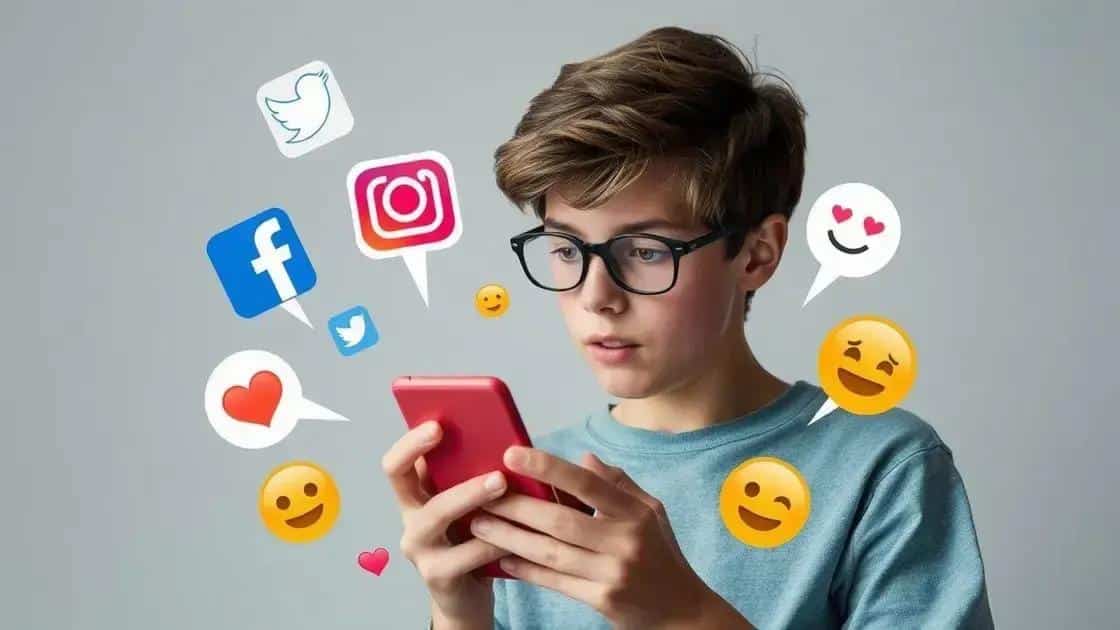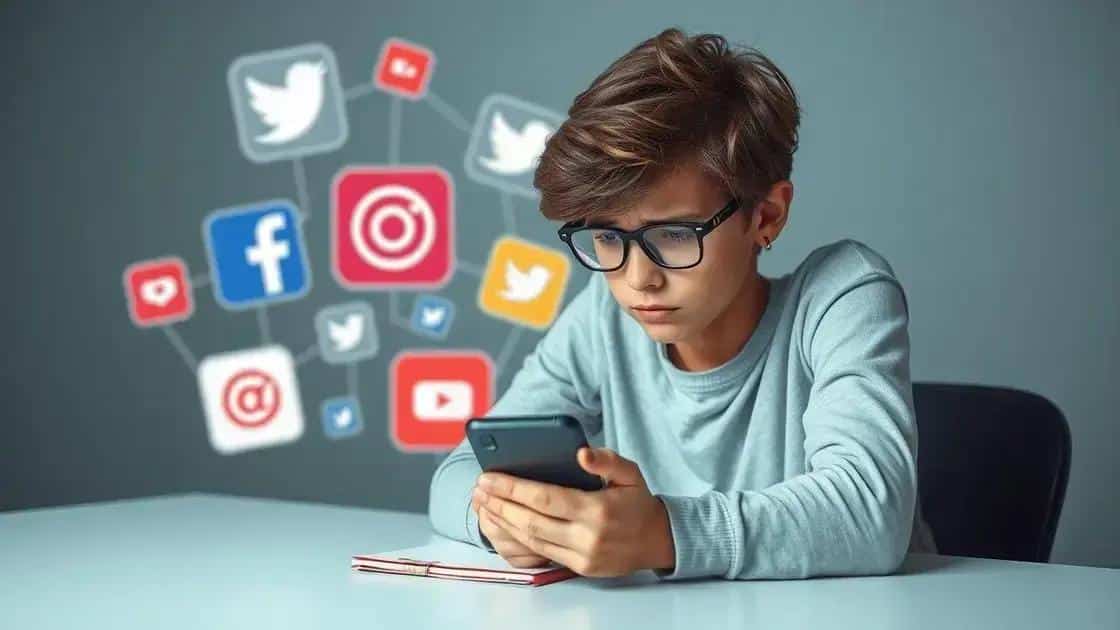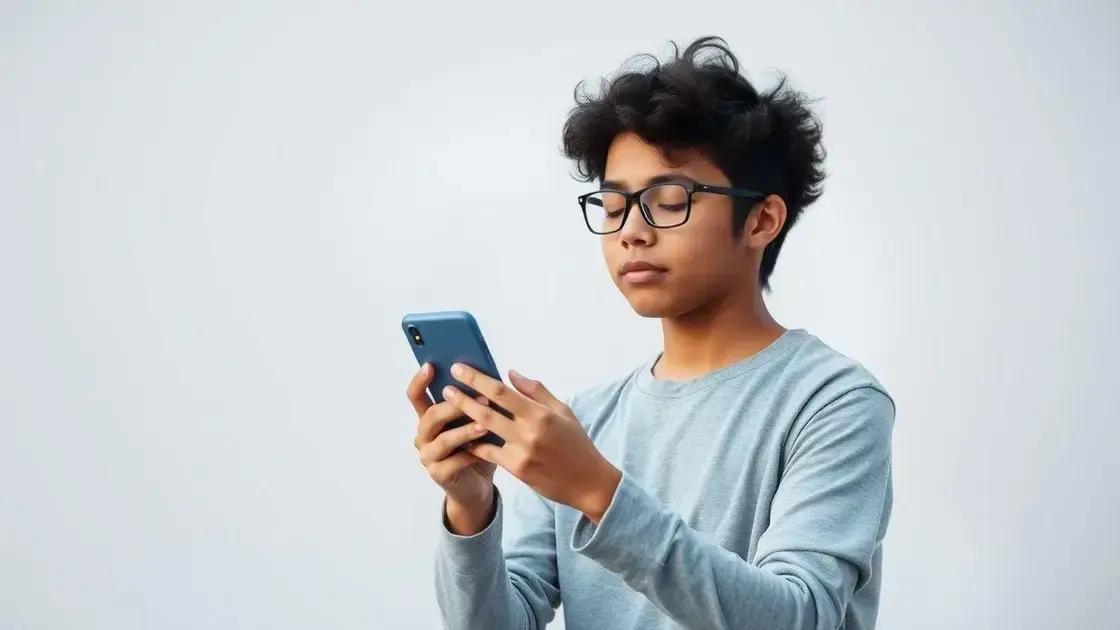Social media impact on youth mental health

Social media impact on youth mental health is significant, as it can affect self-esteem, increase anxiety, and alter real-life relationships, highlighting the need for healthy online habits.
Social media impact on youth mental health is a topic that deserves our attention. With platforms so integrated into daily life, it raises questions about their effects on young people. What role does social media play in shaping mental health, and how can we navigate these challenges?
Understanding the influence of social media on self-esteem
Understanding how social media affects self-esteem is crucial, especially for young people. Social media platforms can enhance our feelings of connection but can also lead to negative comparisons.
The role of social media in shaping self-image
Platforms like Instagram and Snapchat showcase carefully curated moments that often do not reflect reality. Young users may feel pressure to match these portrayals, which can distort their perception of themselves.
- Exposure to idealized images can create unrealistic standards.
- Likes and comments can influence feelings of worth.
- Cyberbullying can impact self-esteem negatively.
This influence is complex and varies from person to person. While some users may feel empowered by positive feedback, others may struggle with feelings of inadequacy. Building self-awareness is essential to counter these effects.
Strategies to maintain a healthy self-image
Encouraging a positive relationship with social media can help protect young people’s self-esteem. Here are some helpful strategies:
- Limit time spent on social media.
- Engage with positive content and unfollow negative influences.
- Discuss feelings and experiences with trusted friends or family.
It’s important to remember that social media is just one part of life. Fostering self-esteem comes from within, influenced by real-world interactions and activities.
The connection between social media use and anxiety

The connection between social media use and anxiety is increasingly evident in today’s digital world. Many young people find themselves feeling anxious due to their online interactions.
How social media can trigger anxiety
Frequent engagement on social media platforms can lead to anxiety for several reasons. Users often compare their lives with the edited versions of others’ lives. This comparison can foster feelings of jealousy and inadequacy.
- Receiving negative comments can heighten stress levels.
- Fear of missing out (FOMO) can create anxiety about social activities.
- Online bullying can have serious emotional impacts.
Moreover, the constant need for validation through likes and comments can make individuals feel unstable in their self-worth. Anxious feelings can arise from waiting for responses or worrying about their online images.
Reducing anxiety through mindful social media usage
By practicing mindfulness, young people can mitigate anxiety linked to social media. Here are some effective strategies:
- Limit the time spent scrolling through feeds.
- Unfollow accounts that trigger negative emotions.
- Engage in offline activities to build confidence.
Encouraging open discussions about feelings related to social media can also help. Sharing experiences with friends can lessen the burden of anxiety and foster supportive relationships.
How online interactions affect real-life relationships
Online interactions play a significant role in shaping real-life relationships. While social media can connect people, it can also create barriers to meaningful connections.
The impact of social media on friendships
Many friendships develop through social media, allowing people to stay in touch easily. However, these digital interactions can sometimes lack the depth of face-to-face communication. As a result, the quality of friendships may diminish.
- In-person visits tend to strengthen bonds more than online chats.
- Surface-level interactions may replace meaningful conversations.
- Social media can lead to misunderstandings due to lack of tone and context.
While young people often feel connected online, they may struggle with feelings of loneliness in real life. This paradox highlights the need for a balance between online and offline interactions.
Navigating real-life relationships in a digital world
To maintain healthy relationships, it’s essential to prioritize face-to-face time. Engaging in real-world activities can enhance connections.
- Plan regular meetups with friends to strengthen ties.
- Participate in community events to meet new people.
- Encourage open discussions about feelings and experiences.
By striking a balance between social media use and in-person connections, individuals can foster deeper relationships and better emotional well-being.
Strategies for promoting healthy social media habits

Strategies for promoting healthy social media habits are crucial for young people today. With the pervasive use of social media, it’s essential to cultivate a balanced approach.
Establishing clear boundaries
Creating boundaries for social media usage can help reduce stress. Setting specific times for checking notifications can help users stay in control and avoid constant distractions.
- Limit social media use to certain hours of the day.
- Avoid screens during meal times to encourage presence.
- Designate tech-free zones in the home.
By having set times, young people can focus more on real-life interactions and enjoy their free time without the pull of social media.
Encouraging positive engagement
It’s important to promote positive content on social media platforms. Encouraging young people to follow accounts that inspire and uplift can be beneficial.
- Share positive quotes or stories that resonate.
- Engage with uplifting and educational content.
- Support friends by sharing positive comments.
This not only builds a supportive online community but also helps reinforce positive self-image and mental health.
Practicing mindfulness and self-reflection
Encouraging mindfulness in social media use is also vital. Taking a moment to reflect on how online interactions make one feel can enhance awareness.
Young people should be encouraged to ask themselves whether social media brings joy or anxiety. This self-reflection can lead to healthier habits.
In conclusion, understanding the impact of social media on youth mental health is vital in today’s digital age. By promoting healthy social media habits, we can help young people navigate their online interactions with confidence. Establishing boundaries, encouraging positive engagement, and practicing mindfulness are essential strategies to foster well-being. Remember, social media should enhance relationships, not hinder them. Finding a balance can lead to healthier, more fulfilling connections in both online and offline worlds.
FAQ – Frequently Asked Questions about Social Media Impact on Youth Mental Health
How can social media affect youth self-esteem?
Social media can lead to negative comparisons and unrealistic standards, impacting self-esteem by creating feelings of inadequacy.
What strategies can help reduce anxiety linked to social media?
Limiting time on social media, engaging with positive content, and discussing feelings with friends can help reduce anxiety.
How can parents promote healthy social media habits in their children?
Parents can encourage open discussions about online experiences, set boundaries for usage, and model positive engagement with social media.
What is the importance of balancing online and offline interactions?
Balancing online and offline interactions fosters deeper relationships in real life, reducing feelings of loneliness and enhancing emotional well-being.






